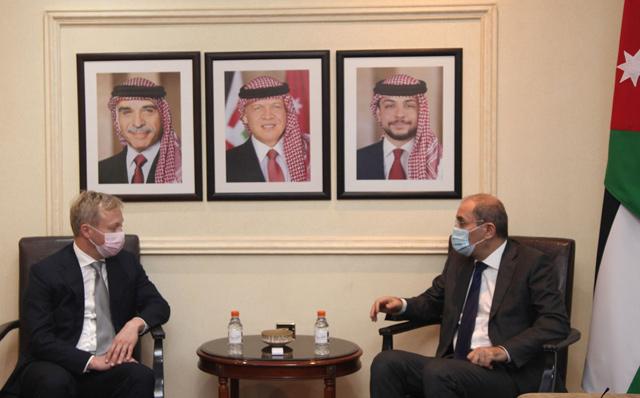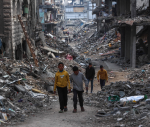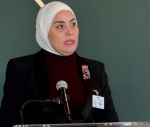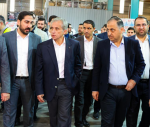You are here
FM warns against continued absence of prospects for Mideast peace
By JT - May 25,2022 - Last updated at May 25,2022
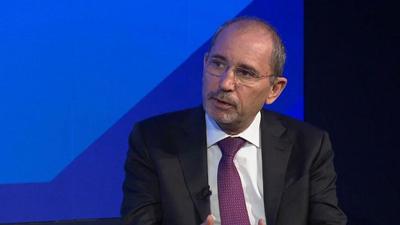
Deputy Prime Minister and Foreign Minister Ayman Safadi speaks during a dialogue session at the World Economic Forum in Davos on Tuesday (Photo courtesy of Foreign Ministry)
AMMAN — Deputy Prime Minister and Foreign Minister Ayman Safadi on Tuesday warned against the continued absence of prospects for a just and comprehensive peace in the region, as well as the illegal Israeli measures that undermine the two-state solution and push towards the "one-state" reality, an "evil reality" that would instil the "apartheid".
Speaking during a dialogue session at the World Economic Forum held in Davos, Safadi stressed that there is no alternative to the two-state solution, the sole way to achieve a fair and comprehensive peace, according to a Foreign Ministry statement.
During the session, attended by Saudi Foreign Minister Prince Faisal Bin Farhan, Kuwaiti Foreign Minister Sheikh Ahmed Nasser Al Mohammed Al Sabah and President of the Kurdistan Region in Iraq Nechirvan Barzani, Safadi said that peace is a strategic Arab choice and a global need, whose sole path is the two-state solution that leads to the establishment of an independent and sovereign Palestinian state on the June 4, 1967 lines, in line with international law, living side-by-side with Israel in peace and security.
He also renewed condemnation of the assassination of Al Jazeera’s Palestinian journalist Shireen Abu Akleh, noting that eyewitnesses reported that she was shot dead by Israeli troops. The foreign minister emphasised the need for launching an international probe to hold perpetrators accountable.
He also denounced the attack on the reporter's funeral, wondering "in what world can such horrible inhuman behaviour be committed without accountability?”
During the session, moderated by CNBC's Hadley Gamble, Safadi stressed that international law and the UN Charter must be implemented fairly and according to one standard for all issues.
Responding to a question, Safadi noted that the establishment of an international order based on shared values and the rule of law requires to be applied fairly and without selectivity over all issues, specifically the Palestinian cause-related issues.
He also stressed the need for maintaining international support for refugees and host countries, warning against the shrinking support for the United Nations Relief and Works Agency for Palestinian Refugees (UNRWA) and Syrian refugees.
On the impacts of the Ukrainian crisis, Safadi highlighted the need for a comprehensive action to deal with these implications that manifested the depth of exchange among the countries and the fragility of the mechanism of joint international action.
He also highlighted the importance of helping Lebanon to avoid collapse and activate the joint Arab efforts to reach a political solution to the Syrian crisis and support Iraq's stability.
He also emphasised the importance of regional cooperation to face energy, water and climate change related challenges.
On the sidelines of the forum, Safadi met Finland's Foreign Minister Becca Havisto, and Rwanda's Foreign Minister Vincent Perotta.
Safadi also met Barzani and Congressman Ted Deutch, Chairman of the Middle East, North Africa, and Global Counterterrorism Subcommittee.
Talks went over advancing bilateral relations and the latest regional and global developments, and issues of shared interest, as well as efforts towards resolving the crises and dealing with their repercussions.
Related Articles
AMMAN — Foreign Minister Ayman Safadi on Monday continued the Kingdom's efforts to form an international stance against the Israeli annexati
AMMAN — Deputy Prime Minister and Foreign Minister Ayman Safadi on Friday strongly denounced the "inhumane and hateful Israeli attacks"
AMMAN — Deputy Prime Minister and Foreign Minister Ayman Safadi on Monday met EU Special Representative for the Middle East Peace Process Sv



